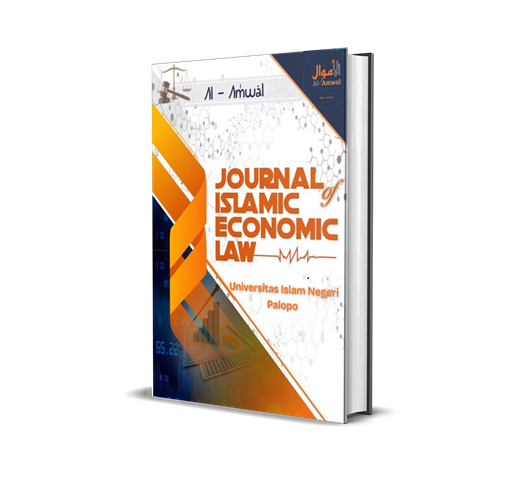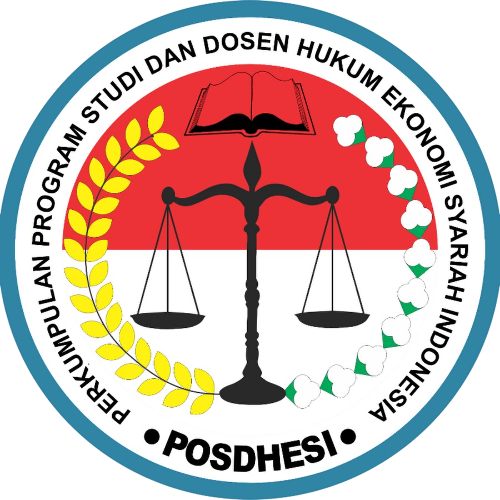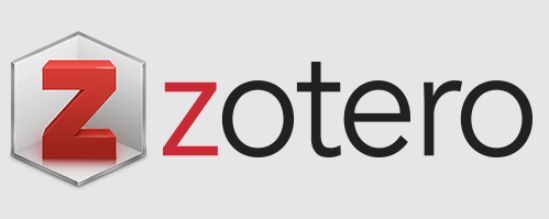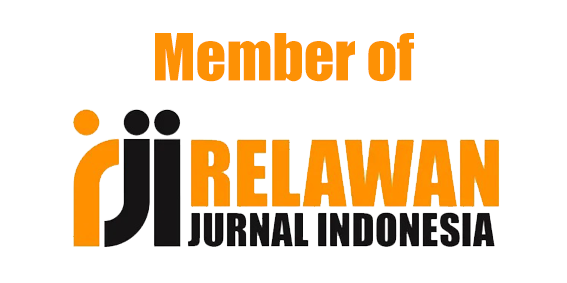The Meaning of Consuming Halal Products According to Muslim Millennial Generation in Realizing Of Maqasid Sharia “Maslahah”
DOI:
https://doi.org/10.24256/alw.v10i2.6485Keywords:
Halal Meaning, Halal Lifestye, Millenial, Social IdentityAbstract
Purpose – This study aims to explore the meaning of the concept of halal product consumption by millennial Muslims as part of their identity and lifestyle. The main focus is to understand how millennial Muslims interpret halal product consumption not only as a religious rule but also as a symbol of quality, and social identity.
Method – The research method used is quantitative and qualitative, qualitative data collection using in-depth interviews with 10 informants and supported by survey data from 70 millennial Muslim generation respondents with purposive sample techniques. The respondents came from students of the Sharia Faculty of IAIN Kerinci, Study Program "Islamic Law and Sharia Economic Law", semester 7 and above. The population was 120 students using a questionnaire instrument with 10 question items. The data were analyzed to identify the main themes related to the meaning of the concept of halal product consumption in everyday life
Result –The results of the study show that millennial Muslims have a broader meaning of halal, including aspects of sustainability, ethics, and health. Halal is no longer limited to food, but has become a lifestyle that includes the beauty, fashion, and financial sectors. This generation sees halal products as a marker of identity, allowing them to express their religious commitment in modern society. In addition, halal is also seen as a symbol of quality and safety that provides a sense of comfort in social interactions, thus attracting both Muslim and non-Muslim consumers.
Implication – As a practical implication, the results of this study can be used as one of the information for halal industry researchers. This study provides a picture that halal has transformed into a symbolic direction and is in the midst of society.
References
Adinugraha, H. H., & Sartika, M. (2019). Halal Lifestyle Di Indonesia. An-Nisbah: Jurnal Ekonomi Syariah, 5(2). https://doi.org/10.21274/an.2019.5.2.layout
Amalia, F. A., Sosianika, A., & Suhartanto, D. (2020). Indonesian Millennials’ Halal food purchasing: merely a habit? British Food Journal, 122(4), 1185–1198. https://doi.org/10.1108/BFJ-10-2019-0748
Auda, J. (2008). Maqasid al-Shariah as Philosophy of Islamic Law A Systems Approach. The International Institute of Islamic Thought.
Aziz, N. I. A., & Ahmad, F. A. (2018). The Halal Lifestyle of Muslim Working Women. International Journal of Academic Research in Business and Social Sciences, 8(5), 1121–1129. https://doi.org/10.6007/ijarbss/v8-i5/4489
Azizan Ramli, Mazlin Mokhtar, Tuan Sidek Tuan Muda, & Badhrulhisham Abdul Aziz. (2016). Pembangunan Industri Halal: Konsep Halalan-Toyyiban dan Pengurusan Keselamatan Industri dalam Kerangka Maqasid alShariah. ’Ulum Islamiyyah, 18, 91–114. http://ddms.usim.edu.my/bitstream/123456789/14840/1/5- ulum islamiyyah 18.pdf
Bonne, K., Vermeir, I., Bergeaud-Blackler, F., & Verbeke, W. (2007). Determinants of halal meat consumption in France. British Food Journal, 109(5), 367–386. https://doi.org/10.1108/0070700710746786
Deuraseh, N., & Asli, N. A. (2022). ISSUES ON HALAL FOODS WITH SPECIAL REFERENCE TO FATWA ON HALAL PET FOOD FOR CATS IN ISLAMIC LAW. El-Mashlahah, 12(2), 103–123. https://doi.org/10.23971/elma.v12i2.3534
Elasrag, H. (2016). Halal Industry : Key Challenges and Opportunities Halal Industry : Key Challenges and Opportunities. Munich Personal RePEc Archive, 69631.
El-Gohary, H. (2016). Halal tourism, is it really Halal? In Tourism Management Perspectives (Vol. 19, pp. 124–130). Elsevier. https://doi.org/10.1016/j.tmp.2015.12.013
Fadhillah, N. (2023). Representasi Gaya Hidup Halal dalam Iklan Wardah “Perfect Bright Moisturizer” 2018. Jurnal Ilmu Komunikasi, 6(1). https://doi.org/10.33021/exp.v6i1.4470
Fikri, F., Aris, A., Muchsin, A., & Mahrous, A. E. (2023). Contextualization of Utilities in Law and Maqasid Al-Shariah in Halal Lifestyle Culture in Makassar City. Jurnal Ilmiah Al-Syir’ah, 21(1), 35. https://doi.org/10.30984/jis.v21i1.2310
Fischer, J. (2010). Halal Sanitised: Health and Science in a Globalised Religious Market. Tidsskrift for Islamforskning, 4(1), 24–47. https://doi.org/10.7146/tifo.v4i1.24585
Haleem, A., Khan, M. I., Khan, S., & Jami, A. R. (2020). Research status in Halal: a review and bibliometric analysis. Modern Supply Chain Research and Applications, 2(1), 23–41. https://doi.org/10.1108/mscra-06-2019-0014
Hashim, S. N. A., Mazlan, M., & Shafie, S. N. A. (2019). Aplikasi Gaya hidup Halal sebagai Usaha Mencapai Matlamat Pelaksanaan Pembangunan Lestari Islam. Jurnal Ulwan, 4, 128–136. https://infad.kuim.edu.my/index.php/JULWAN/article/view/499%0Ahttps://infad.kuim.edu.my/index.php/JULWAN/article/viewFile/499/425
Huda, F., & Setiyowati, A. (2023). Halal Lifestyle: A Study of Revitalizing Islamic Consumption of Middle Class Muslims (pp. 186–194). https://doi.org/10.2991/978-2-38476-022-0_20
Iberahim, H., Kamaruddin, R., & Shabudin, A. (2012). Halal development system: The institutional framework, issues and challenges for halal logistics. ISBEIA 2012 - IEEE Symposium on Business, Engineering and Industrial Applications, Mlc, 760–765. https://doi.org/10.1109/ISBEIA.2012.6422993
Iflah, I. (2020). Wisata Halal Muslim Milenial. Jurnal Common, 3(2), 153–166. https://doi.org/10.34010/common.v3i2.2601
Irawati, I., & Ithof, M. (2020). Al-Qur’an, Gaya Hidup Halal, dan Fusion Of Horizons: Studi QS. Al-Baqarah (2): 168. REVELATIA: Jurnal Ilmu al-Qur`an Dan Tafsir, 1(2), 117–130. https://doi.org/10.19105/revelatia.v1i2.3811
Jannah, S. M., & Al-Banna, H. (2021). HALAL AWARENESS AND HALAL TRACEABILITY: MUSLIM CONSUMERS’ AND ENTREPRENEURS’ PERSPECTIVES. Journal of Islamic Monetary Economics and Finance, 7(2), 285–316. https://doi.org/10.21098/jimf.v7i2.1328
Kamali, M. H. (2010). THE HALĀL INDUSTRY FROM A SHARĪ’AH PERSPECTIVE Understanding the Parameters of Halāl and Harām. May.
Khan, M. I., & Haleem, A. (2016). Understanding “ Halal ” and “ Halal Certification & Accreditation System ” - A Brief Review. Saudi Journal of Business and Management Studies, 1(1), 32–42.
Khotimah, U. K. (2018). Labelisasi Halal di Tengah Budaya Konsumsif. Jurnal Sosiologi Agama, 12(2), 283. https://doi.org/10.14421/jsa.2018.122-06
M. Fuad Nasar. (2017). Negara dan Sertifikasi Halal Indonesia. Https://Kemenag.Go.Id/Opini/Negara-Dan-Sertifikasi-Halal-Indonesia-Cfxy63.
Mejova, Y., Benkhedda, Y., & Khairani. (2017). Halal Culture on Instagram. Frontiers in Digital Humanities, 4(November), 1–10. https://doi.org/10.3389/fdigh.2017.00021
Muchsin, A., & Mahrous, A. E. (2023). Contextualization of Utilities in Law and Maqasid Al-Shariah in Halal Lifestyle Culture in Makassar City. Jurnal Ilmiah Al-Syir’ah, 21(1), 35–54. https://doi.org/10.30984/jis.v21i1.2310
Muheramtohadi, S., & Fataron, Z. A. (2022). The Islamic Lifestyle of the Muslim Middle Economy Class and the Opportunities for the Halal Tourism Industry in Indonesia. Journal of Digital Marketing and Halal Industry, 4(1), 91–104. https://doi.org/10.21580/jdmhi.2022.4.1.10828
Mulyana, R. A. (2024). Geliat Gaya Hidup Halal Global: Peluang dan Tantangan. In Likuid Jurnal Ekonomi Industri Halal (Vol. 4, Issue 1). https://doi.org/10.15575/likuid.v4i1.30742
Mutmainnah, M. (2022). Implementasi dan Sejarah Panjang Logo Halal Indonesia. Jurnal Ekonomi Dan Bisnis Islam (JEBI), 2(1), 23–36. https://doi.org/10.56013/jebi.v2i1.1318
Nadila, D. L., Islamawati, N. F., & Dhiyanda, Z. M. A. (2023). Halal Lifestyle Sebagai Wajah Islam Al-Wasathiyah. J-CEKI : Jurnal Cendekia Ilmiah, 2(2), 198–205. https://doi.org/10.56799/jceki.v2i2.1401
Nikmatul, M. (2020). Dinamika Identitas dan Religiusitas pada Branding Halal Di Indonesia. ISLAMICA: Jurnal Studi Keislaman, 14(2), 317–338. https://www.researchgate.net/publication/275307096
Qadri, H. M.-D. (2024). Halal Industry. The Global Halal Industry, 27–43. https://doi.org/10.4324/9781003441540-3
Rafita, H. Z. (2017). Pengaruh Label Halal Terhadap Keputusan Pembelian Produk Kosmetik (Studi Pada Mahasiswi Fakultas Ekonomi Dan Bisnis Islam Angkatan 2013- 2016 UIN Raden Intan Lampung). Fakultas Ekonomi Dan Bisnis Universitas Islam Negeri (UIN) Raden Intan Lampung, 108–110.
Rahman, N. A. A., & Al Balushi, Z. (2022). Halal logistics certification: A Middle East perspective. In Halal Logistics and Supply Chain Management (pp. 222–229). Routledge.
Repelita, Iskandar, N., & Mursal. (2024). Halal Without Label: Implementation of Maqāṣid Al-Sharī’Ah in Community-Based Tourism in Kerinci, Indonesia. Malaysian Journal of Syariah and Law, 12(1), 192–205. https://doi.org/10.33102/mjsl.vol12no1.477
Riegel, U., Penthin, M., Engel, D., & Pirner, M. L. (2024). Measuring Muslim Lifestyle by a Halal-Scale. Relegion, 1–16. http://dx.doi.org/10.31219/osf.io/qt465
Rina Darojatun. (2019). Tren Produk Halal, Gaya Hidup Syar’i dan Kesalehan Simbolik: Studi Tentang Muslim Kelas Menengah. Wardah, 19(2), 135–157.
Rohim, A. N., & Priyatno, P. D. (2021). Pola Konsumsi dalam Implementasi Gaya Hidup Halal. Maro: Jurnal Ekonomi Syariah Dan Bisnis, 4(2), 26–35. https://doi.org/10.31949/maro.v4i2.1302
Salam, T., Muhamad, N., & Abd Ghani, M. (2019). Exploring Muslim millennials’ perception and value placed on the concept of ‘Halal’in their tourism preferences and behaviours. In The Routledge handbook of Halal hospitality and Islamic tourism (pp. 130–142). Routledge.
Saleh. (2019). Pariwisata Halal Di Aceh. In SAHAFA Journal of islamic Comunication (Vol. 1, Issue 2). http://lifestyle.liputan6.com
Shamsudin, M. F., Hassan, S., Majid, Z. A., & Ishak, M. F. (2020). How Halal Brand Trust and Halal Brand Image Influence Halal Brand Purchase Intention. In Journal of Critical Review (Vol. 7, Issue 4).
Sukardani, P. S., Setianingrum, V. M., & Wibisono, A. B. (2020). Halal Lifestyle: Current Trends In Indonesian Market. 226(Icss), 334–339. https://doi.org/10.2991/icss-18.2018.68
Susanty, A., Puspitasari, N. B., Silviannisa, S., & Jati, S. (2023). Measuring halal logistics implementation. Journal of Islamic Marketing, 14(7), 1669–1695. https://doi.org/10.1108/JIMA-08-2021-0266
Susilawati, C., Joharudin, A., Abduh, M., & Sonjaya, A. (2023). The influence of religiosity and halal labeling on purchase intention of non-food halal products. Indonesian Journal of Halal Research, 5(2), 77–89.
Talib, M. S. A., & Wahab, S. N. (2024). Halal and Health: Applying Theory of Constraints to Optimise Halal Healthcare Supply Chain. In Hospital Supply Chain: Challenges and Opportunities for Improving Healthcare (pp. 141–160). Springer.
UU JPH NO 33 2014, JAMINAN PRODUK HALAL (2014).
Vanany, I., Soon, J. M., Maryani, A., & Wibawa, B. M. (2020). Determinants of halal-food consumption in Indonesia. Journal of Islamic Marketing, 11(2), 516–530. https://doi.org/10.1108/JIMA-09-2018-0177
Widyanto, H., & Sitohang, I. (2021). Muslim millennial’s purchase intention of halal-certified cosmetics and pharmaceutical products: the mediating effect of attitude. Journal of Islamic Marketing. https://doi.org/10.1108/JIMA-04-2020-0117
Wilson, J. A. J. (2014). The halal phenomenon: An extension or a new paradigm? Social Business, 4(3), 255–271. https://doi.org/10.1362/204440814x14103454934294
Wilson, J. A. J., & Liu, J. (2010). Shaping the Halal into a brand? In Journal of Islamic Marketing (Vol. 1, Issue 2, pp. 107–123). https://doi.org/10.1108/17590831011055851
Wilson, J. A. J., & Liu, J. (2011). The challenges of Islamic branding: Navigating emotions and halal. Journal of Islamic Marketing, 2(1), 28–42. https://doi.org/10.1108/17590831111115222
Yusuf, E., & Yajid, M. S. A. (2017). Related topic: Halal cosmetics. Skin Permeation and Disposition of Therapeutic and Cosmeceutical Compounds, 101–107.
Downloads
Published
How to Cite
Issue
Section
Citation Check
License
Copyright (c) 2025 Mursal - Mursal, Muhammad Fauzi, Alan Rakhmat Putra, Al Mahdi

This work is licensed under a Creative Commons Attribution-ShareAlike 4.0 International License.

























